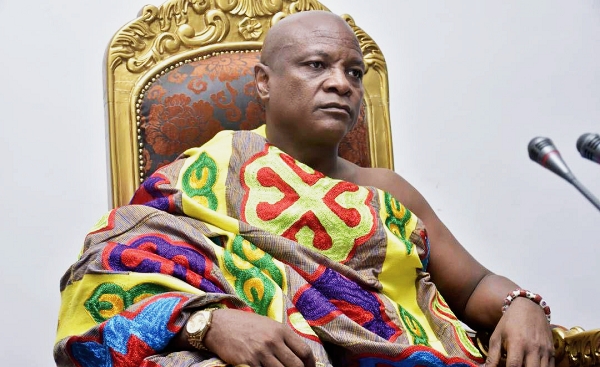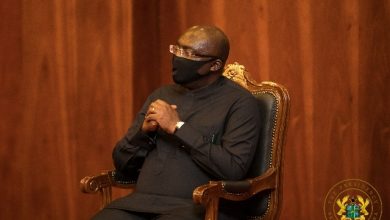BoG has ‘lost focus’; now ‘competing’ with banks for profit via high interest rates – Togbe Afede





Togbe Afede XIV
Togbe Afede XIV has accused the Bank of Ghana of having lost focus in contributing to the macro-economic objectives of stability, growth and employment creation and rather competing with the banks for profits through high lending rates.
Speaking during a call on him by Speaker of Parliament Alban Bagbin and a delegation of MPs recently in the Volta Region, the Agbogbomefia of the Asogli State observed: “We have always been in a high-inflation and high-interest rate environment”.
“Mr Speaker, you spoke quite rightly about the need for the private sector to lead the development of this country. But how can the private sector do it if it has to borrow at very atrocious rates, even in a pandemic environment, of between 25 and 30%?” he wondered.
The traditional leader, who is also a businessman, said the COVID-19 pandemic led to a fall in demand and incomes across board, and “many countries relaxed monetary policy in order to stimulate their economies”.
In Ghana, he said “we appeared to have done the opposite”.
“Private entrepreneurs or enterprises don’t have stacks of money that they just go and dip into to fund their businesses. They have to depend on the banking system. So, no amount of your hard work would bring the development that we need when borrowing rates are so high. We want the youth to go into private business but with what kind of capital? Expensive, highly-priced 25% or 30%? Those cannot do it, and we have been victims of this over the years”, he noted.
The investment banker, who founded the SAS Group of companies said “the scapegoat has always been government borrowing, the high indebtedness of government” but added: “I don’t think that is where all the problem is”.
“I will give a few statistics to show that there is something wrong with our interest rates: UK’s debt to GDP ratio is about 104%. Ghana’s is 81%. Relatively, we are better. The per capita indebtedness of the UK is $42,000, ours is $1,400. Compared to income per capita, we are much better. Our income per capita is $2,300, that of the UK is $40,000. So, UK’s debt per capita, $42,000, is higher than income per capita, $40,000. Our debt per capita $1,400, is much less than our income per capita, $2,300”.
“So, relatively, the UK is more indebted than Ghana, yet the rate at which the Bank of England lends to banks currently is 0.1%, while Bank of Ghana lends to our banks at 13.5%. That is a whopping one hundred and thirty-five times the Bank of England rate! Astonishing!” he noted.
He pointed out that UK’s GDP, “which reflects the size of the economy, is $2.7trillion, almost 40 times the size of our economy, which is $72billion (GDP). But guess what? Bank of England made a profit of £57million ($76million) in 2020/21, down from £72million ($96million) in 2019/20. Bank of Ghana, on the other hand, made a profit of GHS1.57billion ($270million) in 2020, down from GHS1.8billion ($310million) in 2019. The question is, doing what?”
“Yes, that is the benefit from their 13.5% lending rate. Mr Speaker, this is where the problem has been but we don’t seem to know”, he complained.
Read Togbe Afede’s full speech below:
COURTESY CALL BY
SPEAKER RT. HON. ALBAN BAGBIN AND MEMBERS OF PARLIAMENT
Excerpts from Address by Togbe Afede XIV, November 20, 2021
The Rt. Hon. Speaker and Members of Parliament,
As I’ve always said, poverty is not God’s desire for man. That is why the pursuit of happiness is an inalienable human right. Our people deserve to be happy, and it behoves on you and I, as leaders, to work together to ensure that the happiness that our people deserve, can come to be part of their lives. But it would require certain actions, and I would like to share my thoughts on a few.
The most important, of course, is to ensure better planning and management of our economy, and this, coincidentally, is what has brought you here. For now, I want to focus on our monetary policy. That is one segment of policy that has received the least scrutiny. Not since 2003 when I complained about monetary policy in this country has there been any open debate about how monetary policy has been conducted.
We have always been in a high-inflation and high-interest rate environment. Mr Speaker, you spoke quite rightly about the need for the private sector to lead the development of this country. But how can the private sector do it, if it has to borrow at very atrocious rates, even in a pandemic environment, of between 25 and 30%. The COVID pandemic led to a fall in demand and incomes across the board, and many countries relaxed monetary policy in order to stimulate their economies. In Ghana, we appeared to have done the opposite.
Private entrepreneurs or enterprises don’t have stacks of money that they just go and dip into to fund their businesses. They have to depend on the banking system. So no amount of your hard work would bring the development that we need when borrowing rates are so high. We want the youth to go into private business, but with what kind of capital? Expensive, highly-priced 25% or 30%? Those cannot do it, and we have been victims of this over the years.
The scapegoat has always been government borrowing, the high indebtedness of government. But I don’t think that is where all the problem is. I will give a few statistics to show that there is something wrong with our interest rates.
The UK’s debt to GDP ratio is about 104%. Ghana’s is 81%. Relatively, we are better. The per capita indebtedness of the UK is $42,000, ours is $1,400. Compared to income per capita, we are much better. Our income per capita is $2,300, that of the UK is $40,000. So, UK’s debt per capita, $42,000, is higher than income per capita, $40,000. Our debt per capita $1,400, is much less than our income per capita, $2,300.
So, relatively, the UK is more indebted than Ghana, yet the rate at which the Bank of England lends to banks currently is 0.1%, while the Bank of Ghana lends to our banks at 13.5%. That is a whopping one hundred and thirty-five times the Bank of England rate! Astonishing!!
The UK GDP, which reflects the size of the economy, is $2.7trillion, almost 40 times the size of our economy, which is $72billion (GDP). But guess what? Bank of England made a profit of £57million ($76million) in 2020/21, down from £72million ($96million) in 2019/20. Bank of Ghana, on the other hand, made a profit of GHS1.57billion ($270million) in 2020, down from GHS1.8billion ($310million) in 2019. The question is, doing what?!
Yes, that is the benefit from their 13.5% lending rate. Mr Speaker, this is where the problem has been, but we don’t seem to know. Bank of Ghana has lost focus, competing with the banks for profits, instead of contributing to the macro-economic objectives of stability, growth and employment creation.
Now let’s look at our commercial banks. Ecobank in the first nine months of this year, January to September, made a net profit of GHS468million. In a pandemic environment, GHS468million net profit! The equivalent figure for Standard Chartered Bank was GHS385million. These are big increases from the corresponding figures of the previous year. If the economic environment is so difficult, and their costs are high, as they often claimed, how did they make so much profit?
Now, how do the high interest rates help in managing the economy when the high interest the banks charge is not even shared with depositors?
At Ecobank, interest expense was only 12% of interest income in January to September of this year. This meant that out of every GHS100 Ecobank made in interest income, it paid out only GHS12 to depositors. At Standard Chartered Bank, the interest expense to interest income ratio was 20%. At GCB, it was 20% and at SGSSB, it was 21%.
So the banks are making incredible amount of money from the high interest rate environment at the expense of the people, industry, the private sector, the government, and at the expense of our growth. Why do we have to set interest rates so high?
The arguments that I made in 2003, which led President Kufuor to appoint me to the Board of Bank of Ghana, are still relevant:
Our current inflation rate, measured by the year on year change in prices (Consumer Price Index) as at October 31, 2021 (that is, October 31, 2021, vs October 31, 2020) is 11%. Bank of Ghana’s prime rate is 13.5%! The insistence on keeping the prime rate above inflation, defined as above, is wrong. This inflation, in reality, is historical or past inflation, that is, the change in prices (Consumer Price Index) over the past one year. Interest rate, on the other hand, is a forward-looking concept and is the cost of borrowing over the next one year.
So keeping Bank of Ghana’s prime rate at 13.5%, above the 11% (past) inflation, is a self-fulfilling prophecy, and it inadvertently imports the high inflation of the past, into the future. This is why we are trapped in this vicious circle of high inflation – high interest rates – high inflation!
Those in charge of our monetary policy will try to deny this and claim many other factors are taken into account. But the evidence abounds in past data. They always try to keep the Bank of Ghana rate above past inflation. We cannot be “targeting” inflation by making past inflation the basis for fixing the bank rate. It should be a question of what expectation you have about the inflation, which essentially is the “target”.
Mr Speaker, is it not odd that Bank of England’s the prime rate is 0.1%, and Bank of Ghana’s rate is 135 times that, that is 13.5%? How do you borrow, and produce and compete with somebody producing from China or from England borrowing at much lower rates? It’s not possible.
Hence, ours has always been a high-inflation and high-interest rate environment. If our bank rate is not the reason, what could the reason be? This wrong bank rate, and the consequential high interest rates, is itself a key factor in our inflation and in our exchange depreciation. Parity laws easily explain this: You keep money in Government bills, and it grows by, say, 20%, without any corresponding increase in production. That’s inflationary! That puts pressure on our currency!
So, Mr Speaker, in your deliberations, I think you have to look very closely at the inflationary monetary policy that has been our bane in this country. We need fresh thinking.
Over the past nearly 20 years, the prime rate has ranged between 12.5 and 27.5%! Price and exchange rate instability cannot all be blamed solely on government borrowing. There is something wrong, and I’ve demonstrated it within the context of the relativities, looking at England and Ghana in terms of their respective debt to GDP ratios and their respective debt per capita relative to income per capita. I don’t think that we have to live in this kind of atrocious environment that stifles everything and everybody – stifles government, stifles private sector, stifles industry and stifles initiative.
And there is one other related important thing that we have to take a serious look at. Yes, the Bank of Ghana’s independence is desirable. We all accept that it should be so. This independence is the more reason why we need in-built “internal check and balance” and improved transparency, through the separation of the positions of Chairman and Governor of Bank of Ghana.
I want the best for my country. I think it’s about time we look at the Bank of Ghana Act and go for a separation between chairmanship and governorship.
It’s important that we seek improvement in everything that we do and remove lapses wherever we find them, at least for the sake of the future. Our people are suffering, and our youth are suffering from joblessness. These are threats to our security and our future.
Source: classfm








